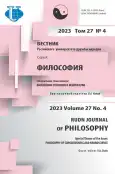Holding and Reversing the Camera Obscura
- Authors: Atanasova N.1
-
Affiliations:
- Sofia University
- Issue: Vol 27, No 4 (2023): PHILOSOPHY OF CONSCIOUSNESS AND NEUROSCIENCE
- Pages: 858-868
- Section: PHILOSOPHY OF CONSCIOUSNESS AND NEUROSCIENCE
- URL: https://journal-vniispk.ru/2313-2302/article/view/325216
- DOI: https://doi.org/10.22363/2313-2302-2023-27-4-858-868
- EDN: https://elibrary.ru/QURKLA
- ID: 325216
Cite item
Full Text
Abstract
The following study examines the critical interplay between ideology, mediated reality, and the role that individuals’ perceptions, beliefs, and actions play in this process. In doing so, the study delves into the examination of the way power structures and dominant narratives proceed into influencing cultural expression and, consequently, impact social action. It is thus argued that in contemporary society, the Situationist notion of “the spectacle” has replaced any understanding of reality and created a reified social world dominated by commodities that reinforce dominant ideologies and determine subjective perceptions. Furthermore, the paper addresses the impact of this mediated reality on personal subjectivity and agency. Drawing on Marx’s metaphor of the “camera obscura” as ideology, it argues for a transformative “reversal of perspective” that changes how individuals view and engage with their environment. Ultimately, this study underscores the profound impact of “the spectacle” on social relations, ideology, and perception. It argues for a transformative and creative approach that challenges individuals to resist the grasp of the spectacle, reclaim their agency, and develop new perspectives for interacting with the world. The extensions of the gaze subtly refer to the basis of economy manifested as “false consciousness” reflected by the camera obscura as an inverted image but readjusted with the tools of spectacles and mirrors within the reflective apparatus.
Keywords
About the authors
Nataliya Atanasova
Sofia University
Author for correspondence.
Email: nataliya.atanasova@protonmail.com
ORCID iD: 0009-0008-8022-6208
PhD Candidate in Philosophy
115 Tsar Osvoboditel Blvd., Sofia, 1504, BulgariaReferences
- Mirzoeff N. How to See the World. Pelican Books; 2015.
- Della Porta GB. Magia Naturalis, sive de miraculis rerum naturalium. Edizione ampliata in 20 volumi. Lib. XVII. Napoli; 1589.
- Lacan J. The Mirror Stage as Formative of the Function of the I as Revealed at Psychoanalytic Experience (1949). New York, London: Ecrits: The First Complete Edition in English; 2006.
- Althusser L. Lenin and Philosophy and Other Essays. Brewster B, transl. New York: Monthly Review P; 2001.
- Debord G. The Society of the Spectacle; 1967. Available from: https://www.marxists.org/reference/archive/debord/society.htm (accessed: 22.07.2023).
- Lukàcs G. The Phenomenon of Reification. In: History and Class Consciousness. Livingstone R, transl. Massachusetts: The MIT Press; 1971. P. 83-110.
- Marx K. The German Ideology Part One with excerpts from Parts Two and Three and Marx’s Introduction to a Critique of Political Economy. New York: International Publishers; 2001.
- Vaneigem R. The Unitary Triad: Self-Realisation, Communication And Participation. In: The Revolution of Everyday Life: Selected Writings. The Anarchist Library Press; 2009.
- Baudrillard J. The Remainder. In: Simulacra and Simulations. Galilee Press; 1981. Available from: https://0ducks.files.wordpress.com/2014/12/simulacra-and-simulation-by-jean-baudrillard.pdf (accessed: 01.08.2023).
- Baudrillard J. Requiem for the Media. In: For a Critique of the Political Economy of the Sign. Levin C, transl. Saint Louis: Telos Press; 1981.
- Gungov A. Circularity in the Philosophical Logic of the Continental Tradition. Sofia: University Press, St. Kliment Ohridski; 2023. (In Bulgarian).
- Rancière J. The Politics of Aesthetics: The Distribution of the Sensible. London: Continuum; 2004.
- Baudrillard J. The Implosion of Meaning in the Media. In: Simulacra and Simulations. Galilee Press; 1981. Available from: https://0ducks.files.wordpress.com/2014/12/ simulacra-and-simulation-by-jean-baudrillard.pdf (accessed: 14.07.2023).
- Augé M. Non-Places: Introduction to an Anthropology of Supermedrnity. Howe J, transl. London: Verso Press; 1995.
- Jameson F. Postmodernism, or the Cultural Logic of Late Capitalism. Durham: Duke UP; 1991.
- Foucault M. Heterotopias: Of Other Spaces. Architecture, Mouvement, Continuité. 1984;(5):46-49.
- Vaneigem R. The Revolution of Everyday Life: Selected Writings. The Anarchist Library Press; 2009.
- Baudrillard J. Möbius - Spiraling Negativety. In: Simulacra and Simulations. Galilee Press; 1981.
- Baudrillard J. Consumer Society. In: Selected Writings. Poster M, editor. Stanford University Press; 2001.
- Wark M. A Hacker Manifesto. Harvard University Press; 2004.
- Lyotard JF. The Postmodern Condition: Report on Knowledge. Geoff Bennington G, Massumi B, transl. Manchester University Press; 1983.
- Home S. What is Situationism: A Reader. AK Press; 1996.
Supplementary files









